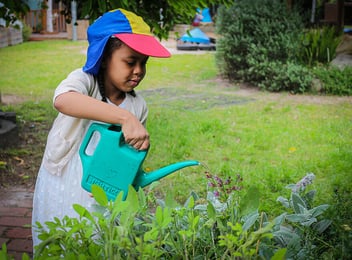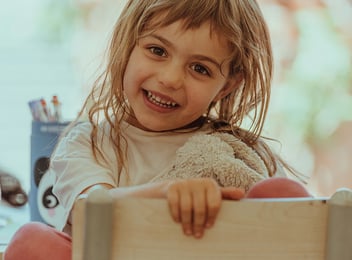At VECTA PD Day 2023, early childhood academic, artist and activist Dr Ruby Red Scarlet generously gave us access to her Anti-Bias Inclusion Room online learning gathering place resources. The resources are based on Dr Red’s extensive research, practice, and pedagogical residencies. For many educators, the process has transformed their understanding of Anti-Bias and how it impacts practice.
Bek Taylor, Educator at Oakhill Children’s Centre in Reservoir says Anti-Bias goes beyond being inclusive. “To include something implies it’s on the outside and you’re letting it in, but with Anti-Bias you’re widening the circle.”
“Before the training, we were doing lots of things well, but we were operating from just trying to be inclusive. It’s a big part of it but taking a step back and thinking critically has allowed us to go to that deeper level.”
Initially tackling the resources solo, Bek and the Oakhill team decided they would get the most out of the process by working on the modules and workbooks together. “In staff meetings we watch the videos, reflect, and have discussions there and then. It's a safe space for people to chat and engage.”
Being open about ingrained bias can be confronting. “No one wants to say I’ve got biases, so to acknowledge your own is hard. I like to think myself a better person!” Making the conversation safe and non-judgmental for everyone is key. Bek explains, “We look around the room and ask, “Describe your life at five, where were you living and what were your family priorities?” With this perspective comes insight that everyone’s experience is vastly different and impacts what we do. “Acknowledging bias doesn’t mean your family is bad or racist, it’s just human.”
Bek describes how Anti-Bias training has changed the team’s daily practice “We’re more open to basic things like how the room is set up and what resources we use.” She says they look for opportunities to embed and explore bias with the children. “I’m wild on gender bias, for example. We keep an ear open in the playground to use spontaneous exploration of what it means and ask is that right and fair?”
And when it comes to working with families, Bek says Anti-Bias is crucial. “Families are complex and not all families are the same; we have children in out-of-home care, mums whose culture doesn’t allow them to show their faces, children with two mums, single mums, and no mums. Every conversation we have is critically inclusive of all children and situations. So, who gets to decide what’s a family? We don’t!”
Awareness dovetails into every aspect of practice with the team taking a bigger-picture approach to understanding their own bias and asking deep questions about what this brings in context of the reality of our world. When they look at programs they ask, ‘who benefits’ and ‘why’?
“We put children at the centre of everything; we ask if some children’s needs are more, and we’re mindful, so all experiences are represented.”
Read On

Spring gardening with children
Spring is upon us! The worst of the cold days are behind us and the sun is starting to show its....png?width=352&name=Playful%20Times%20Blog%20Images%20(1).png)
Community Garden at Kealba
What does it take to create a thriving communal garden? Vision, determination and an enthusiastic...
